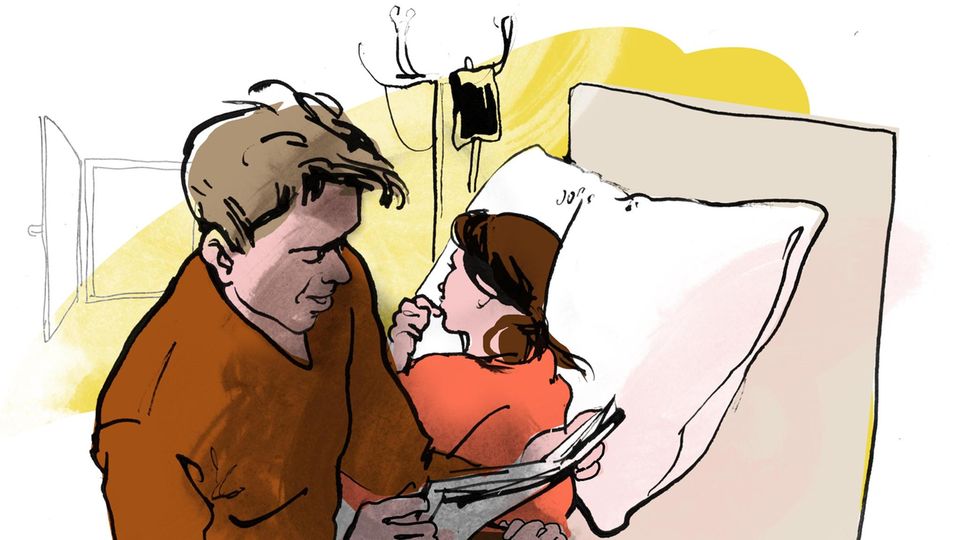The suspicion of cholera on a cruise ship has been dispelled, and more than 3,000 people can breathe a sigh of relief. Why was there so much excitement? What causes cholera and what should you watch out for? The most important facts at a glance.
Cholera is a disease that is so rare in Germany and other industrialized countries that it could almost be considered eradicated in this country. The disease is primarily associated with poor countries, war and disaster areas, and areas where clean water is in short supply. What many people don’t know is that hundreds of thousands of people or more still die every year from the highly contagious intestinal infectious disease. How dangerous can an infection be for the people on board? An overview.
The most important facts about cholera
What is meant by cholera?
Cholera is a disease caused by the bacterium “Vibrio cholera”. As a result, a poison is produced in the intestines, the so-called cholera toxin, which can cause severe diarrhea and vomiting. Cholera is considered highly contagious.
How do you become infected with cholera bacteria?
According to the German Society for Tropical Medicine, Travel Medicine and Global Health (DTG), infection occurs fecal-orally and primarily through “contaminated drinking water, poor hygienic conditions and close contact with sick people”. However, person-to-person infections are extremely rare.
Which people are particularly at risk of developing cholera?
Since stomach acid kills the pathogen “Vibrio cholerae”, people who produce little stomach acid are particularly at risk. As a rule, these are small children and older people as well as people whose stomach acid production is inhibited by taking medication. People with weakened immune systems or those who are malnourished are also particularly at risk. In addition, people with blood group 0 are considered more susceptible to infection with the cholera bacterium than people with blood group AB.
How is cholera diagnosed?
If a cholera infection is suspected, the sick person must either provide a stool sample or a swab is taken in the rectum. The sample is examined in the laboratory for cholera bacteria. If cholera is confirmed, blood and urine are then examined to determine the degree of dehydration. Kidney function is also checked.
In most cases, cholera has no symptoms
How does the disease progress with cholera?
The incubation period can range from a few hours to five days. The symptoms usually subside after three to six days. In most cases, Vibrio cholerae bacteria can no longer be detected in the body of sick people after 14 days. But there are also people who do not have any symptoms, but bacteria can still be detected in their bodies. These people are so-called “carriers” and could infect others.
What are the symptoms of cholera?
In around 95 percent of cases, cholera disease is asymptomatic. This means that infected people do not show any noticeable symptoms. If symptoms occur, they are usually diarrhea, rarely vomiting. As a rule, the stool of sick people progresses from normal to increasingly soft and watery. The main problem with a cholera infection is that there is a severe loss of fluids and electrolytes as the disease progresses. In severe cases, a loss of up to 25 liters of water and salts per day is reported.
This loss can cause sequelae such as circulatory collapse, muscle cramps and cardiac arrhythmias within a few hours. The symptoms also include the so-called cholera face, which is expressed, among other things, by sunken eyes and sunken cheeks. In mild cases, an infection can hardly be distinguished from traveler’s diarrhea; in severe cases, infection with cholera can also be fatal.
How is cholera treated?
To counteract dehydration caused by diarrhea and vomiting, measures are taken to stabilize the body’s water-salt balance. Sick people are therefore given salt-sugar solutions. These are either drunk or administered intravenously. In the fight against the Vibrio cholerae bacterium and the symptoms of the disease it causes, it may also be necessary to take antibiotics. Sick people are isolated. The quarantine is intended to prevent further infections.
Cholera is not a common travel disease
Why do people with cholera have to be quarantined?
In order to avoid both the introduction and spread of certain diseases, a quarantine obligation applies to certain infectious diseases and also in suspected cases. Cholera is one of these diseases.
How dangerous is cholera?
If cholera is treated in a timely manner, the chances of recovery are good, with a survival rate of more than 99 percent. Nevertheless, the WHO estimates that there are 100,000 to 120,000 fatal cases of cholera each year.
How many people get cholera every year?
According to estimates by the World Health Organization (WHO), there are three to five million cases of cholera worldwide every year. Particularly poor countries, war and disaster areas, but also refugee camps are often affected by outbreaks.
In Germany, between 0 and six cases of cholera were registered annually between 2001 and 2023. The last cholera epidemic in Germany occurred in 1892, when 17,000 people were infected in Hamburg and more than 8,600 people died.
How are cholera cases documented?
The Infection Protection Act (IfSG) stipulates that certain diseases must be reported. Diagnosed cases of illness, but also suspected infections and deaths must be reported. Treating doctors, hospitals and infection laboratories are obliged to report.
In which areas of the world is cholera particularly widespread?
Even though cholera occurs all over the world, Central and South America, India, Southeast Asia, especially Indonesia, the Middle East and Africa are considered risk areas. Cholera diseases are rare in industrialized countries, but if they do occur, they are usually diseases that were brought from other countries.
According to the DTG, cholera outbreaks “now occur primarily in the context of natural disasters (e.g. earthquakes, floods, tsunamis) or ongoing military conflicts that lead to impairment or destruction of infrastructure.” For example, a cholera epidemic has been raging in eastern and southern Africa since 2023. According to the UN children’s fund UNICEF, this is the worst outbreak in years. There are reports of around 200,000 cases of illness and 3,000 deaths by mid-January 2024.
How likely is it to get cholera if you travel to risk areas?
According to the DTG, cholera is not a common travel illness. The risk of becoming ill for tourists from Europe and North America is estimated at 2 to 3 cases per million travelers. In a review, only 156 travel-associated cases in non-endemic countries were counted worldwide in almost 30 years (1990–2018). The fact that tourists are at little risk of becoming infected is mainly due to the fact that they usually have access to clean drinking water.
How can you protect yourself from cholera?
What should you pay attention to in countries where cholera is widespread?
People living in areas where cholera is common are advised to follow this rule: “Cook it, boil it, peel it or forget it!” (e.g.: cook it, simmer it, peel it or forget it). Since infection primarily occurs through contaminated drinking water, only boiled or chemically treated water should be used – this applies to brushing your teeth as well as cooking. Fruit should be peeled and ice cubes should be avoided. Food should always be well cooked. And of course: wash your hands regularly. It also doesn’t hurt to have so-called rehydration salts in your first aid kit in case of emergencies.
Should you get vaccinated against cholera?
It is possible to get vaccinated against cholera, but it is generally not recommended for travelers as most cases are atypical. The vaccination is an oral vaccination that is administered twice. The protection rate is around 70 percent. In which cases and when such a cholera vaccination still makes sense should be clarified with a doctor. People living in areas where cholera is endemic can develop natural immunity over time.
Sources:RKI, DTG, UNICEF, Technicians’ Health Insurance, Statista, daily News, MSD Manuals, Ministry of Social Affairs, MPG




